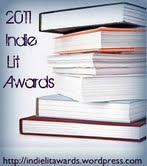Last week, the winners of this year’s Indie Lit Awards (book awards given out by literary bloggers) were announced, and I posted reviews of all five shortlisted books here on the blog. But in the frenzy of posting all those reviews (and getting to write about a Hunger Games-related book in time for the movie premier), I didn’t get to spend much time reflecting on the awards more generally. Hence, the topic of today’s post.
First, as a reminder, here are the five books we considered for the nonfiction short list this year:
- Lost in Shangri-La by Mitchell Zuckoff (winner)
- Berlin 1961 by Frederick Kempe (runner-up)
- The Social Animal by David Brooks
- In the Garden of Beasts by Eric Larson
- Physics of the Future by Michio Kaku
It’s a hefty list. This year, the awards split nonfiction and biography/memoir into two categories, which I think was a good decision. Last year, our panel struggled to compare memoirs with more general nonfiction because they’re often so different from each other in scope, tone, and topic. I think separating them allowed the memoirs to have a more even footing to be compared on, although I could see switching it to nonfiction/biography and memoir.
The biggest challenge I think the nonfiction panel faced this year was that we each gravitated towards different topics and styles. When we did an initial round of ranking the books, four of the five books were picked as the favorite by a panelist. That made it challenging to narrow down the books and pick a winner. However, it also helped that we all mostly enjoyed each of the books, which is a fun problem to have.
One of the interesting discussions that came up as we were talking about all five books (but particularly as we were trying to come to a decision about Lost in Shangri-La versus Berlin 1961) was the question of scope. Does great nonfiction have to take on big topics (the Cold War), or can a book with a smaller story (a single plane crash) have the same impact? Does a large scope make a book better or more important than a more narrow focus?
Although the book with a more narrow focus ended up the winner in this situation, I don’t think we as a panel ever really came to a solid answer on that one (nor do I think there is a single answer). In this case, the fact that Lost in Shangri-La was so well-written and compulsively entertaining helped elevate it to the winner for most of us, but I am still thinking about the scope question (so much so that I think a question of scope will be part of April’s Bloggers’ Alliance of Nonfiction Devotees discussion).
I’m glad I did the Indie Lit Awards again this year because it brought both new books into my reading plans and gave me the motivation I needed to pick up some other books I’d meant to read but simply skipped. I hope you’ll check out the reviews and will be able to find one on our short list to try.


Comments on this entry are closed.
It sounds like a lot of care and consideration was put into choosing the winner.
We did go back-and-forth for quite awhile. It was a much different process than picking the winner last year.
We had similar issues when trying to find a winner in the Fiction panel. Although in our case, it was a battle between just three out of five titles, it was still hard to choose a winner, because each of those books had some merit.
It’s better to have too many good books than not enough, I think 🙂 In this case, it was very much a matter of picking what qualities were most important to us and choosing from there because so many of the books were good in different ways.
I’m glad you decided to show us the process behind picking a winner. For us in the poetry panel, the winner was pretty clear cut but we did ask each other a great question: “What is poetry?”
That’s a tough question! I definitely don’t have an answer for that one 🙂